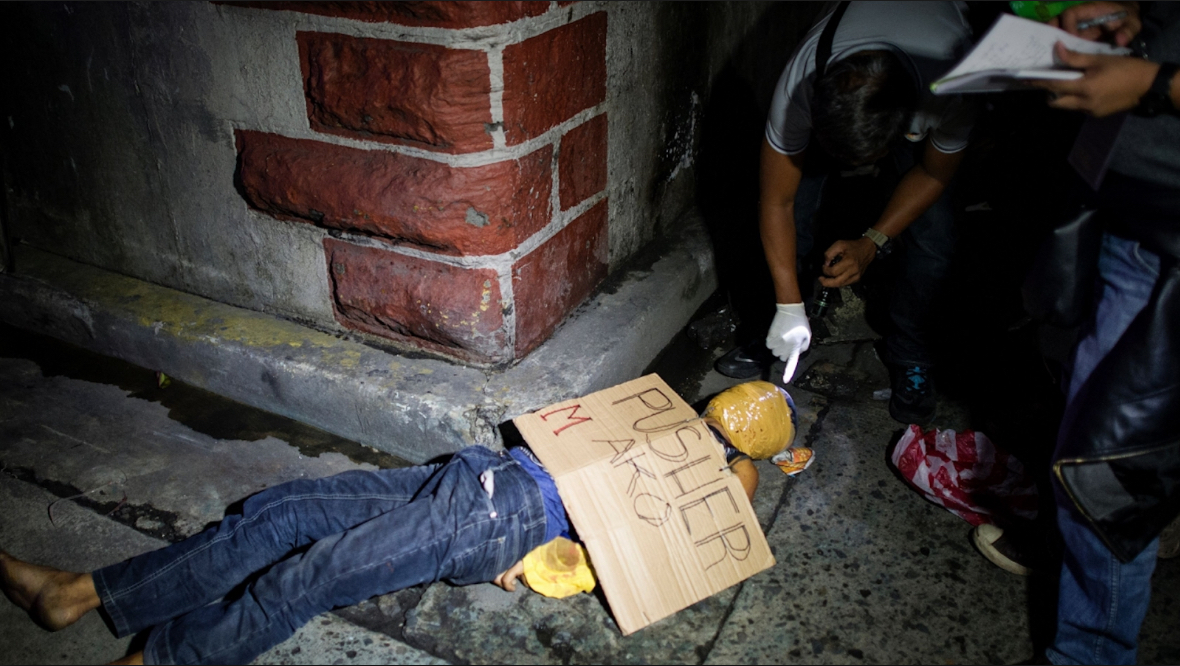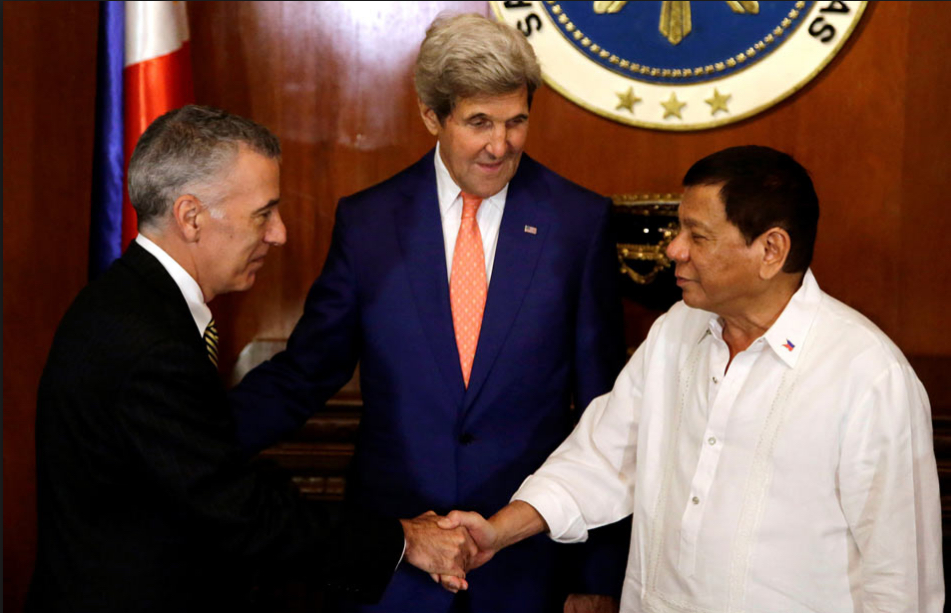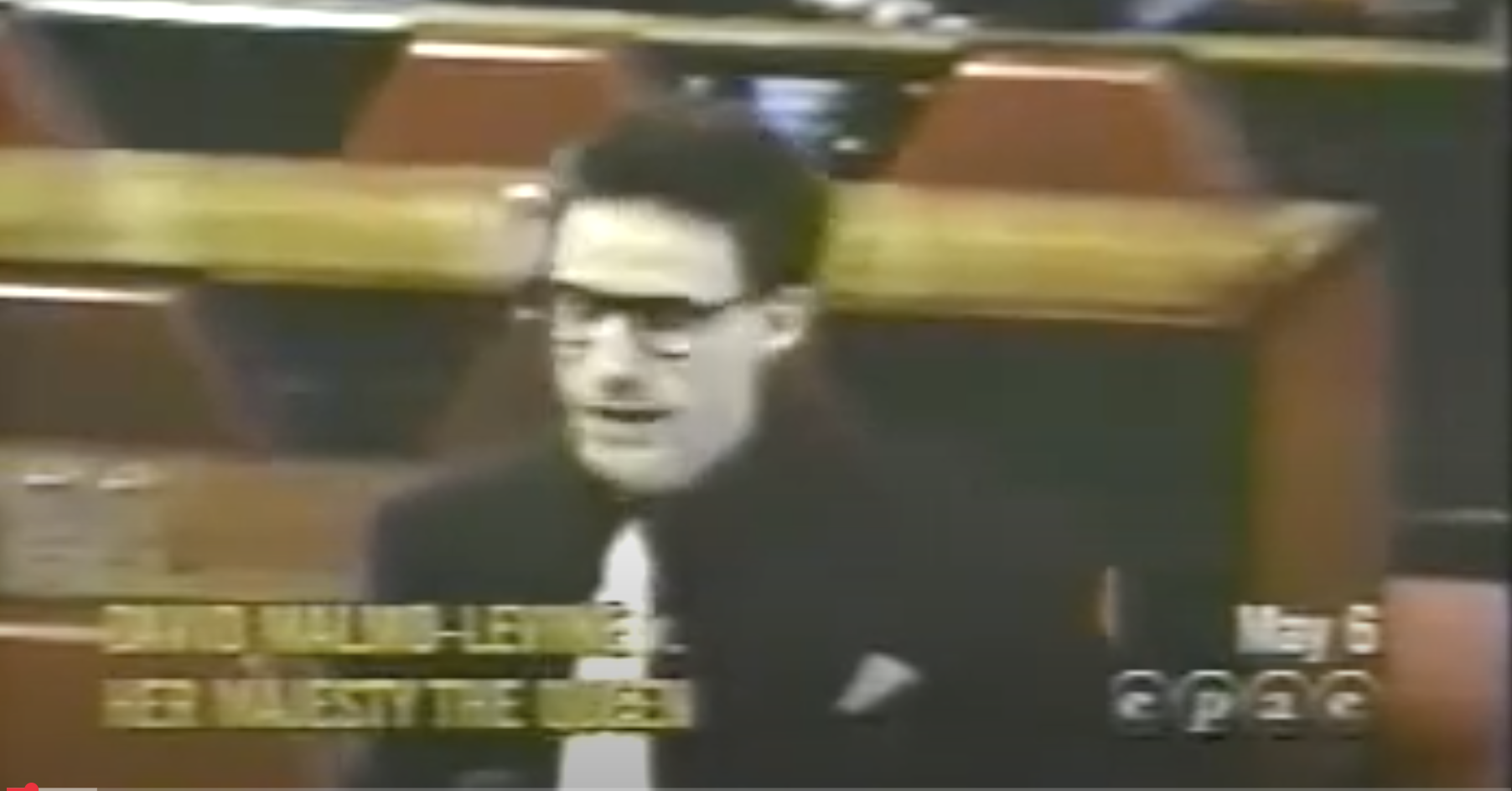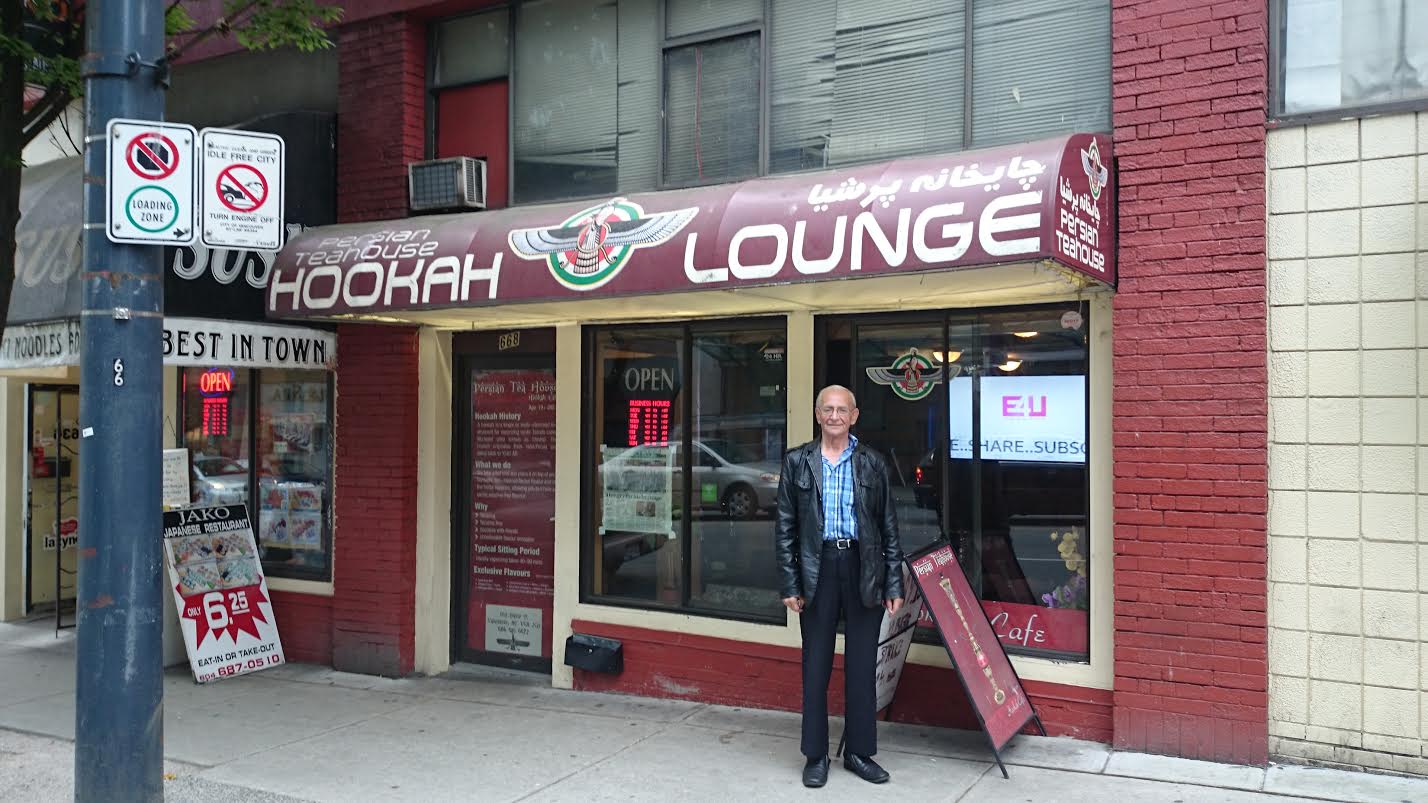Donald Trump, “Duterte Harry” and the Drug War Death Squads

Philippine Government commits genocide on drug users, Trump promises continued support.
The Philippine drug-war genocide is set to be the largest mass murder of scapegoats thus far in the 21st century. As I type and you read it continues to gather steam. Now there’s evidence this culture of massacre was set in motion by…surprise, surprise — the United States Government.
The US supports Philippine death squads with millions of dollars in unsupervised transfer payments. And now Trump – days ahead of his inauguration – praises Philippine president Rodrigo Duterte, as dozens die in his war every day. Trump has even invited Duterte to the White House as an honoured guest.

Blood Bath & Beyond
Shortly after Trump’s victory, Duterte called to congratulate him. In response, President Donald wished Duterte “success” in an anti-drug crackdown that since July has amounted to a death toll of 5,600 and counting.
Every day since Duterte’s election, state-supported police-run death-squads created by the Philippine president have killed an average of 40 suspected drug users and traffickers.
According to Duterte
“’He (Trump) was quite sensitive also to our worry about drugs. And he wishes me well … in my campaign and he said that … we are doing it as a sovereign nation, the right way,’ Duterte said in a statement. Aides to the Philippines president have been quoted saying Trump invited him to the White House next year during a ‘very engaging, animated’ phone conversation. The Guardian reports that a statement from Trump’s team said Duterte congratulated the US president-elect and the two men ‘…noted the long history of friendship and cooperation between the two nations, and agreed that the two governments would continue to work together closely on matters of shared interest and concern’.”

Image from https://www.theguardian.com/world/2016/dec/03/philippines-rodrigo-duterte-donald-trump-white-house-invite
What “matters of shared interest” might he be referring to?
Century Properties Group Inc. of Manila, is the company behind the $150 million tower set to open next year, paid as much as $5 million to use the Trump name. This type of licensing agreement is common for the president-elect’s business model. Trump has at least 10 similar licensing deals around the world, each of which might complicate his administration’s international diplomacy, according to ethics specialists.
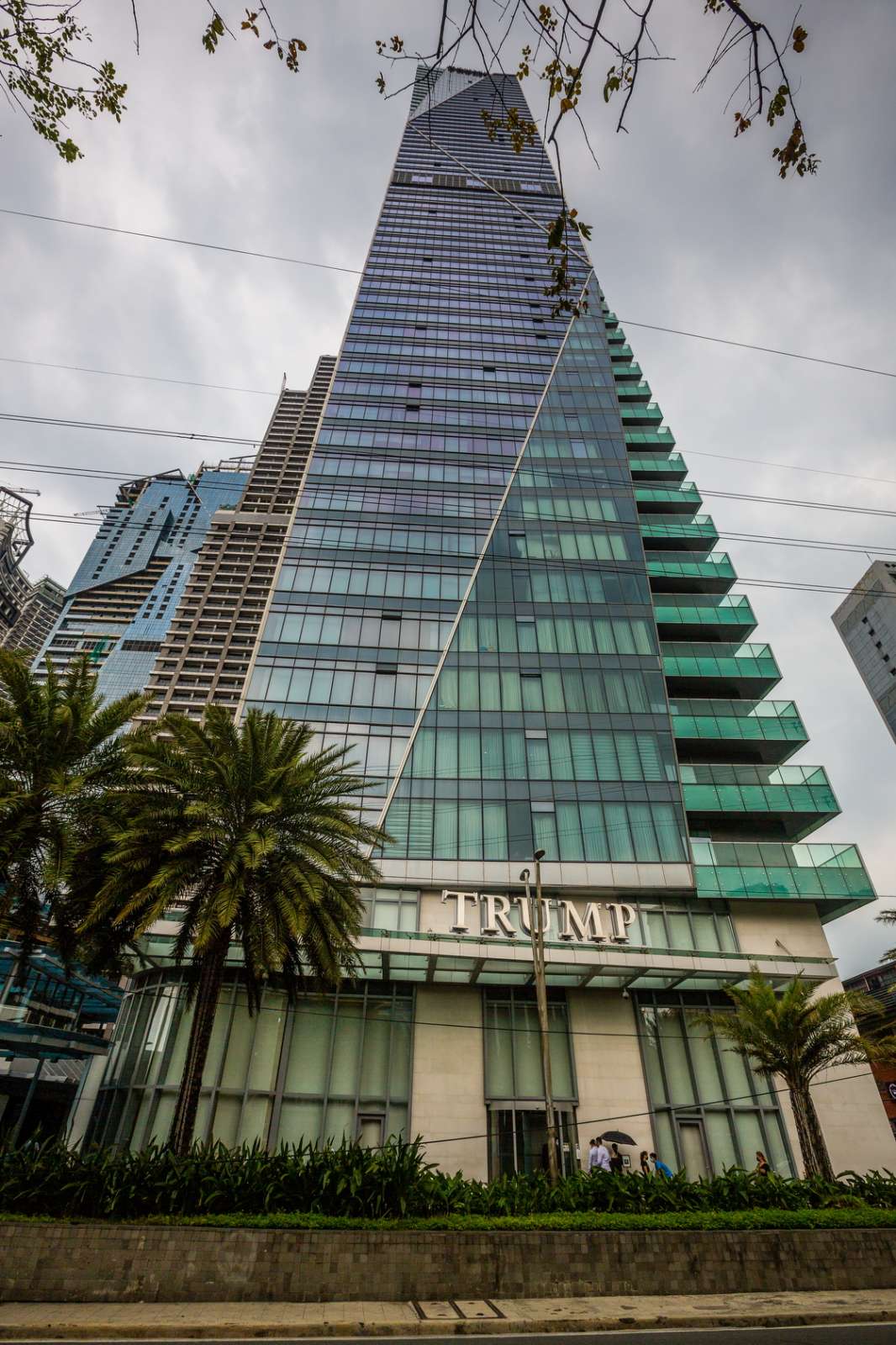
Image from https://www.century-properties.com/residences/trump-tower-philippines/

Image from https://www.trumptowerphilippines.com/

Image from https://www.abs-cbn.com/business/11/28/16/burden-on-trumps-to-disprove-conflict-of-interest-analyst
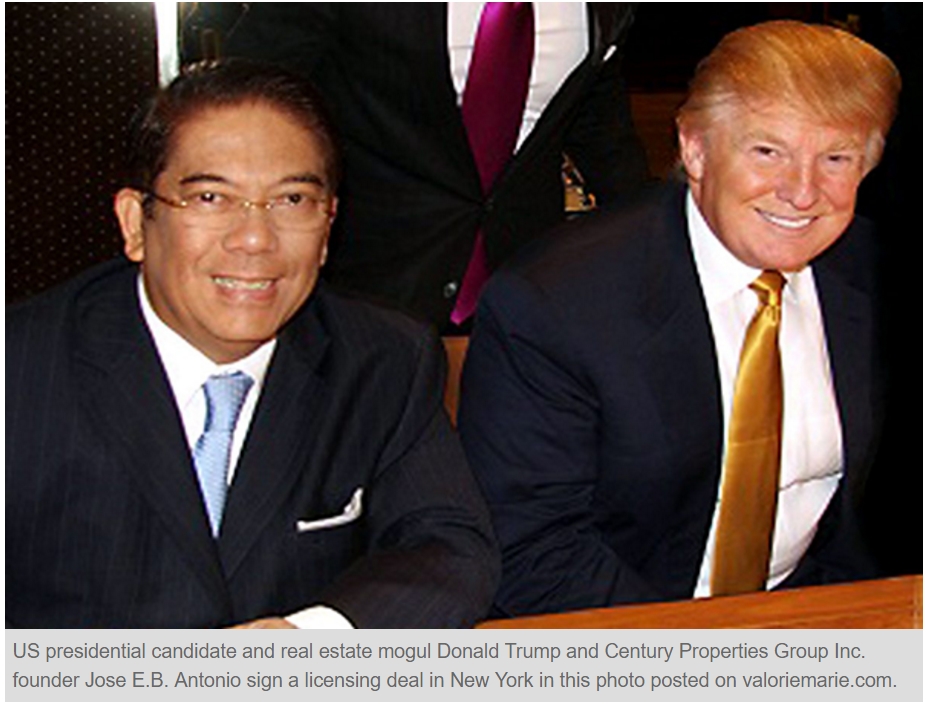
Image from https://asialyst.com/fr/2016/11/08/philippines-duterte-nomme-associe-philippin-trump-comme-nouvel-emissaire-washington/
Meanwhile in Manila, there’s an extra connection: Century Properties’ chief executive and controlling stakeholder, Jose E.B. Antonio, was appointed last month to serve as a special government envoy to the U.S. for Philippine President Rodrigo Duterte, who has vowed to expel American troops from his country and ranted against President Barack Obama. Antonio says he sees “no conflict between his public role and private partnership.”

Image from https://www.abs-cbn.com/business/09/07/18/century-properties-inks-deal-with-israels-globe-invest
The “matters of shared interest” could also be the reported 32 million dollars in aid the US sent Duterte’s regime for “narcotic enforcement” in 2016.

Image from https://www.philstar.com/headlines/2016/07/27/1607298/us-pledges-32m-philippine-law-enforcement
Shoot First, No Questions Later
If you live in the Philippines and you use or sell or smuggle or somehow pay the rent and the bills with heroin, you are hunted to death or forced to turn yourself in and hope for the best. People are murdered every single day
According to an article in The Atlantic of December 1st, 2016, the Philippine National Police (PNP) has reported 5,617 drug-related deaths, 1,959 at the hands of the police—the result of shoot-outs during drug bust operations, they say—and 3,658 vigilante-style killings, usually performed by masked men on motorcycles in pursuit of marked targets.

Image from https://www.theatlantic.com/international/archive/2016/12/rodrigo-duterte-philippines-drugs-widow-human-rights/509030/
Some sources have the death toll at 5,845.

Image from https://www.rappler.com/newsbreak/iq/145814-numbers-statistics-philippines-war-drugs/
If this is true, then the “nearly 40 per day” pace of the massacre is being maintained.
The actual Nazis in 1933 took many more months or even years to kill that many people when they first took power. Duterte has hit the ground running.
The Nazi comparison has been made by many people, including Duterte himself. He says he is sorry that he compared himself to Hitler – sorry for upsetting the Jews, but not sorry for saying he wants to kill millions of people.

Image from “Philippines President likens himself to Hitler, wants to kill 3 million drug addicts,” Euronews, Sept. 30, 2016. https://www.youtube.com/watch?v=Efx6_rXzVMw
Duterte has recently stated that any drug users who dare venture outside their doors will be killed on sight.

Image from https://newsinfo.inquirer.net/848238/duterte-to-drug-users-stay-home-or-ill-kill-you-if-i-see-you
Clearly, The Filipino president, a man who earned the nickname “Duerte Harry” in local media and public gossip, has only turned up the volume since being taking office.
Do You Feel Lucky, Punk?
Duterte served as mayor of Davao City for more than 22 years, a place with a reputation so violent it’s been tagged the “Nicaragua of Asia.” The now president, then mayor, ran on a platform to clean up the city, and today, in Duarte’s wake, the city now has the lowest crime rate in the country…but the tactics impacted a devastating human cost.
It’s widely believed Duterte sanctioned extrajudicial killings by roving packs of vigilantes. These death squads targeted petty criminals, street children and drug dealers, according to Human Rights Watch, claiming the lives of more than 1,000 people, 132 of them children.
Alternatively, he’s been called “The Punisher.” And he’s also declared he will be a “dictator in the battle against evil.”

Image from https://www.theguardian.com/world/2016/may/08/philippines-duterte-harry-the-would-be-president-accused-of-using-death-squads
The parallels in rhetoric and bravado between Trump and Duterte don’t end there.
”Fighting crime” was Duterte’s number one campaign promise while running for the presidency. As Trump has often pointed to “Law & Order” as a favourite talking point.
Yet, Duterte has downplayed comparisons between himself and Trump. Instead, he’s patterned some of his regime in the style of Canadian Prime Minister Justin Trudeau.
But his public persona is often uncannily Trump-esque.
Duterte has also made statements during his election campaign that could accurately be considered “pro-rape”. He does this unapologetically.

Image from https://www.cnn.com/2016/04/17/asia/philippines-election-rodrigo-duterte-gang-rape-comments/
Duterte – like Trump – also likes to talk about his penis:
“’I was separated from my wife. I’m not impotent. What am I supposed to do? Let this hang forever? When I take Viagra, it stands up.’ — Duterte in an April address to the nation’s premier business group, defending his reputation as a womanizer.”

Image from https://newsinfo.inquirer.net/784173/from-pope-to-penis-duterte-shocks-with-trash-talk
“He (Marco Rubio) referred to my hands – if they’re small, something else must be small. I guarantee you there’s no problem.” – Trump, Republican Debate, March 4th, 2016.

Image from Donald Trump defends the size of his privates in GOP debate Channel 4 News https://www.youtube.com/watch?v=5-Av_BaQ3BU
Skull & Bones Frat Boy High Jinks
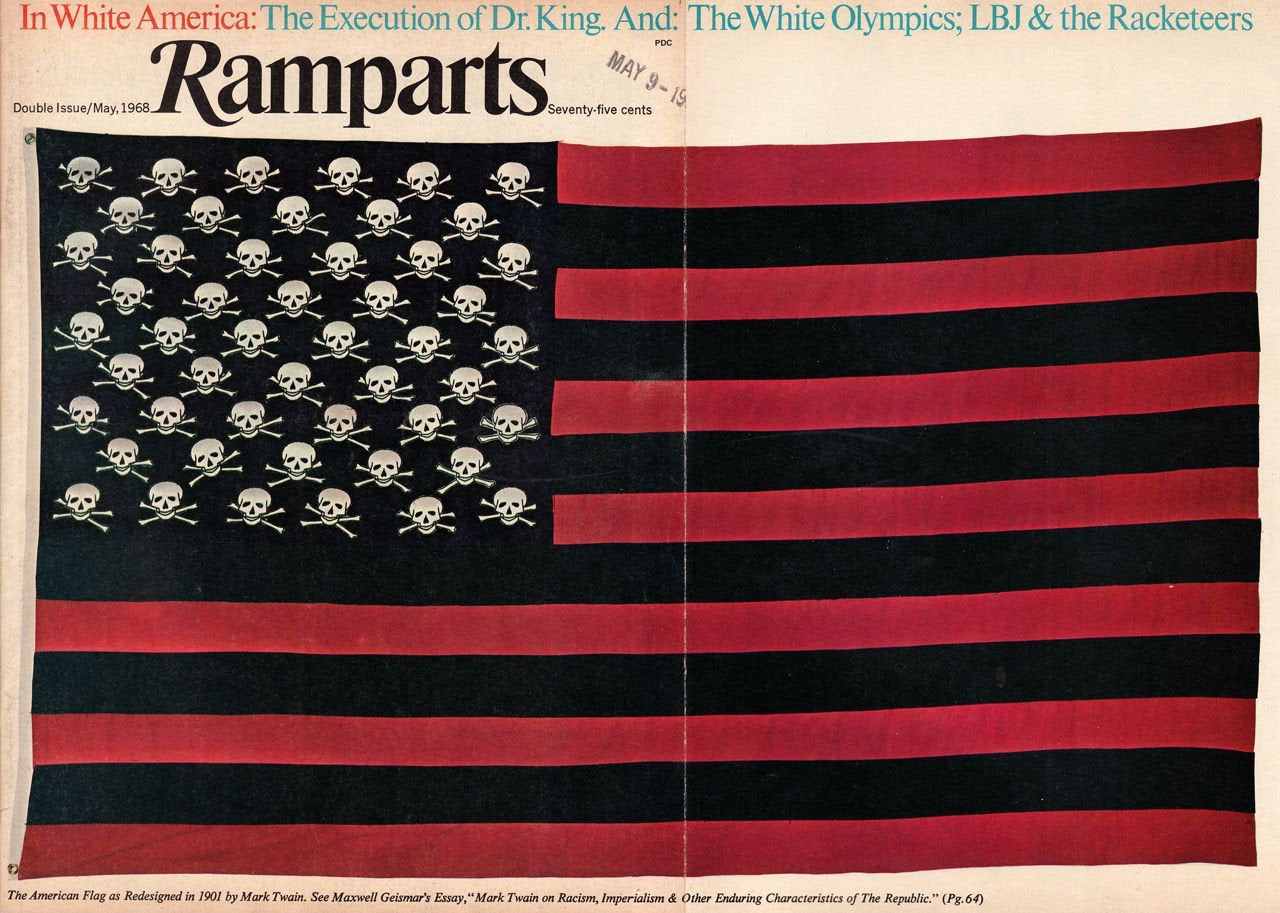
Mark Twain’s redesigned American Flag, from the cover of Ramparts magazine, May 1968. Image from https://mltshp-cdn.com/r/1JPEO
“And as for a flag for the Philippine Province, it is easily managed. We can have a special one—our States do it: we can have just our usual flag, with the white stripes painted black and the stars replaced by the skull and cross-bones.”
- Mark Twain, “To the Person Sitting in Darkness”, North American Revieww, February, 1901. https://en.wikipedia.org/wiki/To_the_Person_Sitting_in_Darkness
If I told you the whole thing was a result of an effort by a bunch of American frat boys about 115 years ago to rule the world by making opium illegal and then getting money to smuggling it under the cover of official government agencies, and then using the money to fund assassination and secret wars, would you believe me?
What if I broke it down for you like so:
Samuel Russell founded Russell & Company in Canton, China, in 1824. Dealing mostly in silks, teas and opium, Russell & Company prospered, and by 1842, it had become the largest American trading house in China. (1)

Russell House. Image from Google Maps. “The Samuel Russell House is a neoclassical house at 350 High Street in Middletown, Connecticut, built in 1828 …” https://en.wikipedia.org/wiki/Samuel_Wadsworth_Russell_House
 It is uncertain if any images exist of Samuel Russell. Image from https://en.wikipedia.org/wiki/Samuel_Russell
It is uncertain if any images exist of Samuel Russell. Image from https://en.wikipedia.org/wiki/Samuel_Russell

“Opium,” Buffalo Courier, Buffalo, New York, September 23rd, 1853, p. 2
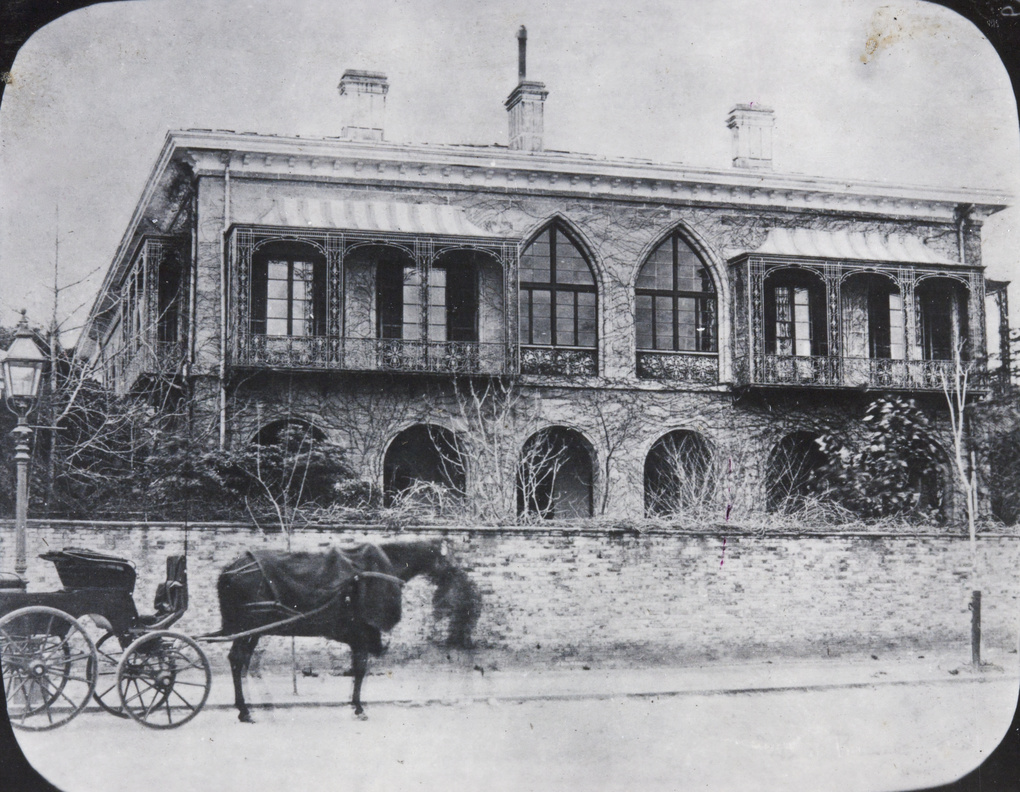
“The old Russell & Co. hong on the corner of the Bund and Foochow Road (Fuzhou Lu). The building was completed in 1856 and was bought by the China Merchants Steam Navigation Co. in c.1881. The structure later underwent extensive modifications, including a new façade. Part of the original building with its distinctive pointed arches can still be seen in Fuzhou Lu. It is probably the oldest surviving Western building in Shanghai.” Image from https://hpcbristol.net/visual/Bi01-072

Image from https://www.columbia.edu/itc/sipa/zelin/pages/opium.html
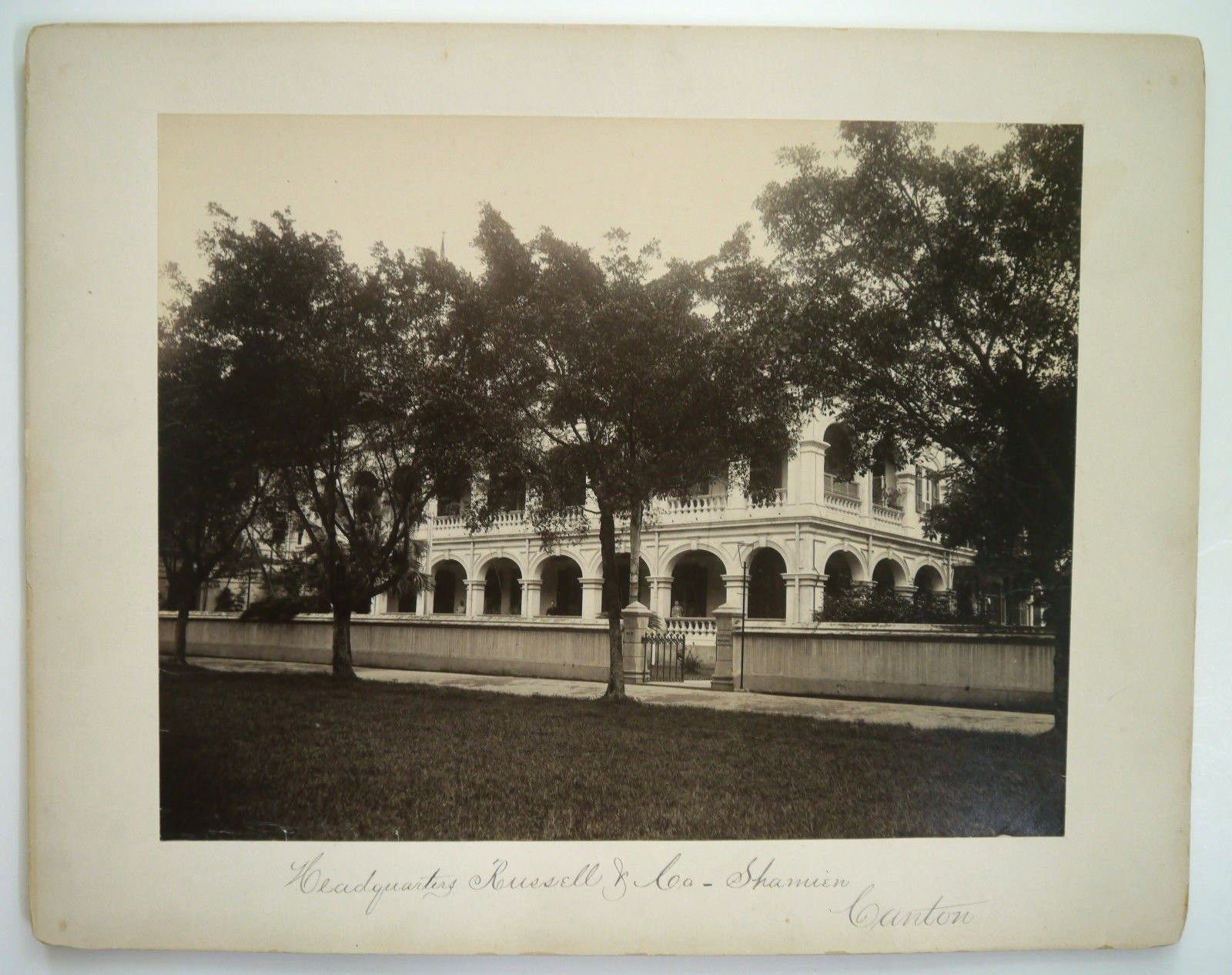
Russell & Company, “Canton headquarters c. 1880” Image from https://en.wikipedia.org/wiki/Russell_%26_Company

The Philadelphia Times, Philadelphia, Pennsylvania,, July 26th, 1891, p. 2
Russell took advantage of opium being illegal (and the massive jack up in prices as a result of prohibition ) in China to make lots of money, quickly, (2) by buying opium legally in Turkey and selling it illegally in China. (3) His Chief Of Operations in the city of Canton, China was Warren Delano Jr. – Grandfather of FDR. (4) Ancestors of Senator John Forbes Kerry – Secretary of State under Barak Obama – also worked for Russell. (5)

The Journal, Newcastle Upon Tyne, Tyne and Wear, England, March 21st, 1840, p. 2

“RECENT DEATHS – Captain Robert Bennett Forbe,” Boston Evening Transcript, Boston, Massachusetts, November 25th, 1889, p. 3
William Huntington Russell (Skull & Bones 1832) – Samuel Russell’s cousin – was one of the founding members of Skull & Bones, along with Alphonso Taft (Skull & Bones 1832). William Huntington Russell used opium money from Russell’s opium-smuggling cousin (Sam Russell), funnelled through their mutual relative, Henry W. Edwards. (6)

Image from https://www.findagrave.com/memorial/14261055/william_huntington-russell

Henry W. Edwards was a member of the Russell/Pierpoint family – his ancestors on both sides founded Yale. Image from https://en.wikipedia.org/wiki/Henry_W._Edwards

Image from “FLESHING OUT SKULL & BONES”, Kris Millegan, Trineday, Walterville, Oregon, 2003, p. 324 https://www.scribd.com/document/167579972/Fleshing-Out-Skull-Bones

Image from https://www.nps.gov/articles/like-father-like-son.htm
Taft’s son William Howard Taft (Skull & Bones 1878) supervised the Philippines as the first US civil governor of the Islands for Theodore Roosevelt between 1901 and 1903, when the Philippines became the first country of the 20th century to launch it’s own war on opium. The American occupiers treated the Philippines as their drug war proving grounds. According to long-time CIA/drug researcher Alfred McCoy wrote that “the Philippine ban … launched America’s attempt at drug diplomacy.” (7) Another drug historian, David Musto, wrote that “The Philippines also gave the United States leadership of the international control of narcotics, a role it still holds.” (8) Taft appointed a three-man “Opium Committee” to investigate the “opium situation”, who then released a report light on evidence and heavy on ideology. (9)
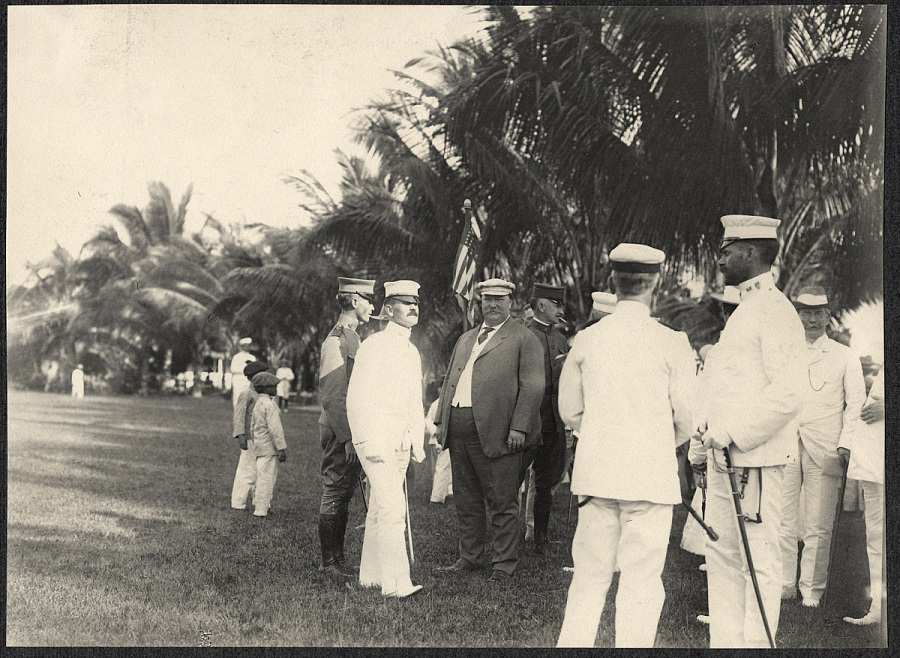
William Taft in Zamboanga, in the Philippines. Image from Alice (Rooosevelt) in Asia: The 1905 Taft Mission to Asia https://asia-archive.si.edu/essays/alice-in-asia/

William Taft in Zamboanga, in the Philippines. Image from Alice (Rooosevelt) in Asia: The 1905 Taft Mission to Asia https://asia-archive.si.edu/essays/alice-in-asia/
W. C. Whitney (Skull and Bones 1863), who married Flora Payne (of the Standard Oil Payne dynasty), was Secretary of the Navy between 1885 and 1889. His attorney was a man named Elihu Root. Root hired Henry Stimson (Skull and Bones 1888), out of law school. Stimson became Secretary of War in 1911 – appointed by fellow Bonesman William Howard Taft. (10) It was Root who convinced Taft to become Governor of the Philippines. (11)
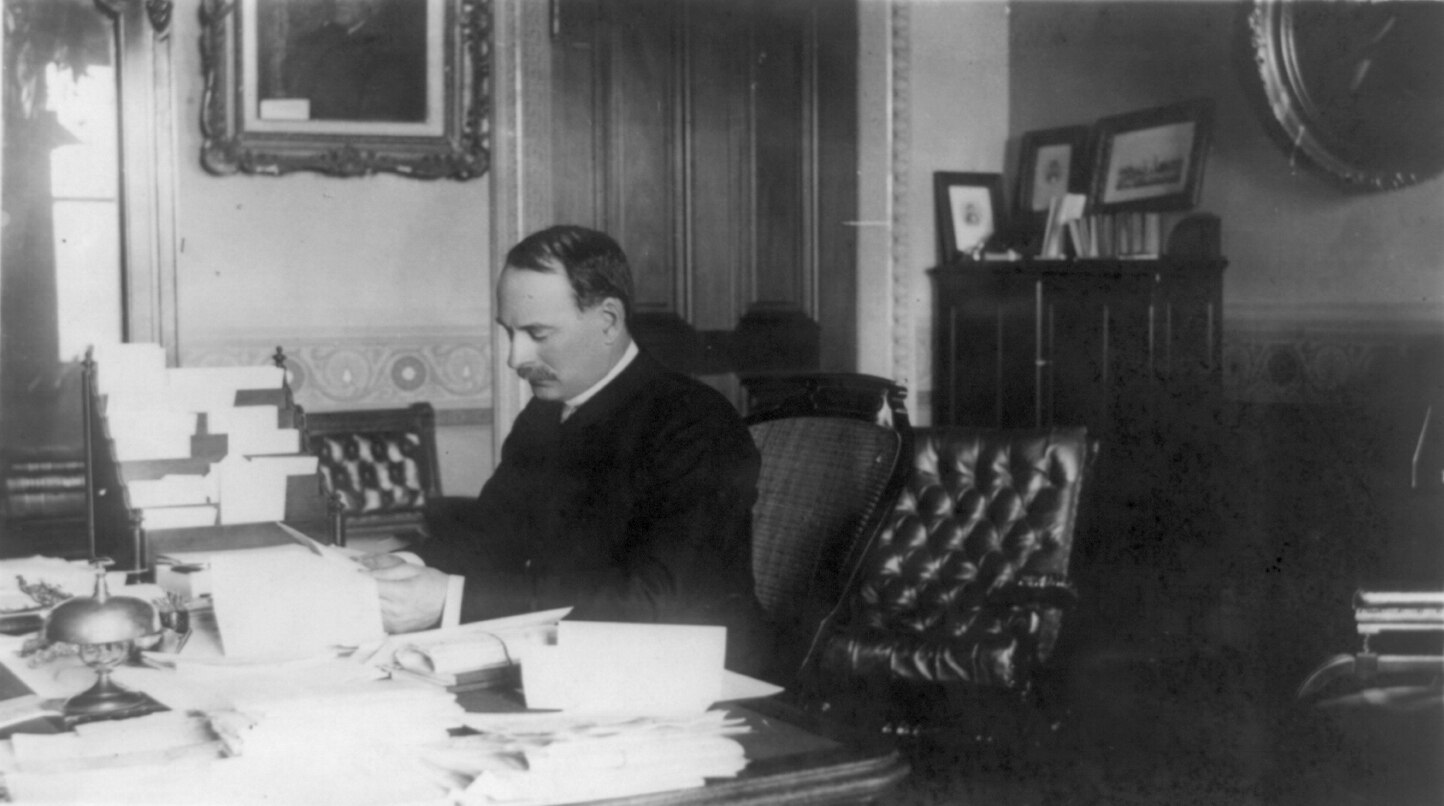
William Collins Whitney. Image from https://www.wikiwand.com/en/articles/William_Collins_Whitney
 Image from Elihu Root: Nobel Peace Prize Recipient And Manhattan Real Estate Pioneer, Judicial Notice, Issue #15, 2020 https://history.nycourts.gov/wp-content/uploads/2021/06/20_Judicial_Notice-min-min.pdf
Image from Elihu Root: Nobel Peace Prize Recipient And Manhattan Real Estate Pioneer, Judicial Notice, Issue #15, 2020 https://history.nycourts.gov/wp-content/uploads/2021/06/20_Judicial_Notice-min-min.pdf

William Taft and Elihu Root. Image from https://picryl.com/media/william-howard-taft-full-length-standing-facing-slightly-right-with-elihu-root
 Image from https://ballsandstrikes.org/legal-culture/elihu-root-imperialist-legacy/
Image from https://ballsandstrikes.org/legal-culture/elihu-root-imperialist-legacy/
 Image from The Ord Quiz, January 7th, 1909, p. 5
Image from The Ord Quiz, January 7th, 1909, p. 5

Image from https://content.time.com/time/magazine/0,9263,7601261018,00.html

Elihu Root. Image from https://ballsandstrikes.org/legal-culture/elihu-root-imperialist-legacy/
Root was Secretary of War from 1899 to 1904, in President William McKinley’s cabinet. As Secretary of War, Root responded to charges of brutality in the Philippines: “The war in the Philippines has been conducted by the American army with scrupulous regard for the rules of civilized warfare … with self-restraint and with humanity never surpassed.” (12) Modern estimates of the number of Filipinos killed in the Philippine-American War and the Moro Rebellion run as high as 1.4 million. (13)

According to historian William Blum, “William McKinley’s idea of doing the very best by the Filipinos was to employ the United States Army to kill them in the tens of thousands, burn down their villages, subject them to torture, and lay the foundation for an economic exploitation which was proudly referred to at the time as ‘imperialism’ by leading American statesmen and newspapers.” (14)

Image from “Philippine-American War” https://espressostalinist.com/genocide/philippine-american-war/
If you look at the careers of these Skull & Bonesmen – Taft, Stimpson, Root and Harrison – not only did they create the modern day drug war in their recently-acquired colonial proving-grounds of the Philippines, but they then transported that same drug war to their own country, and other Bonesmen took advantage of those laws to make money smuggling drugs and used that money to set up assassination squads and secret armies to kill people in Cuba, Laos, Nicaragua and other places too. But that’s another story for another day.
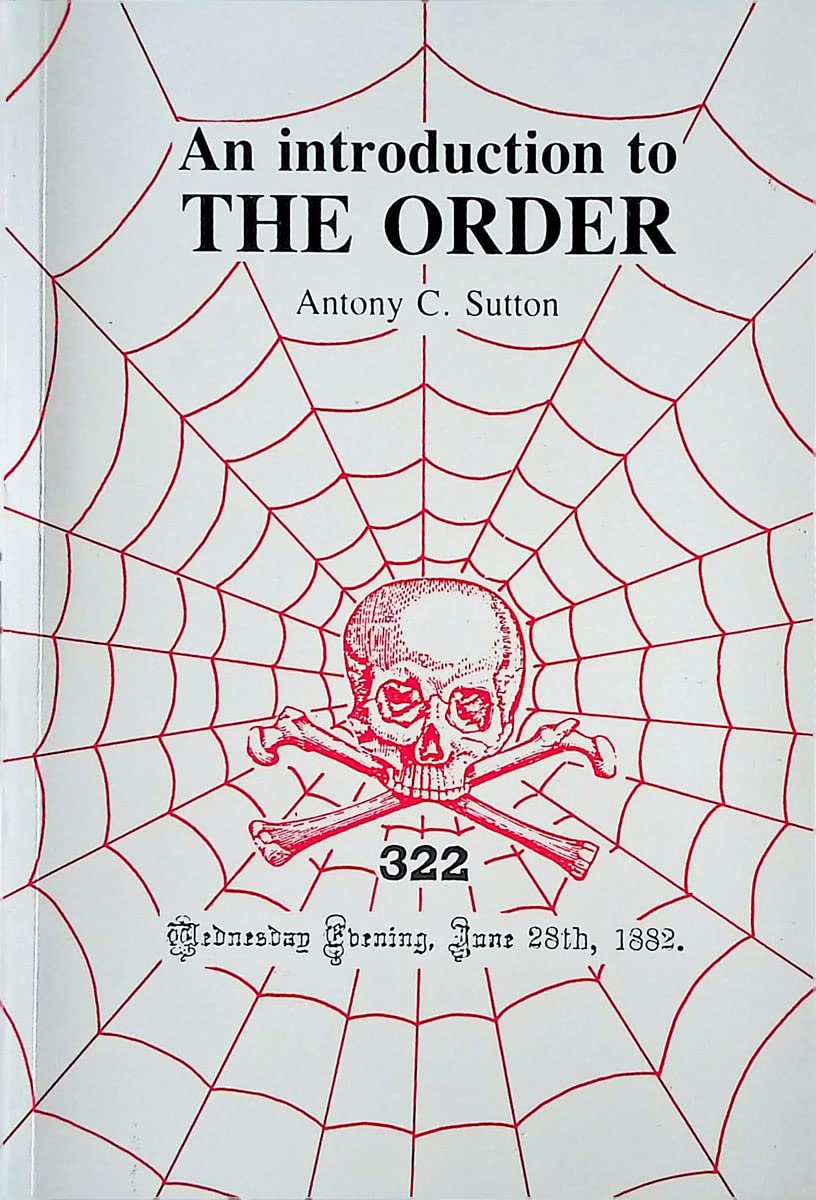
“Fuck You!” Says Duterte
It’s good to know the history of the US/Philippine drug war. It’s a history that most people – including most of the people reporting on the “Philippine Drug War” – are unfamiliar with, which is why they leave the US part out of the name.
At least Duterte seems to be up on the “long history of cooperation” between the US and the Philippines – even if he didn’t mention the slaughter of his own people by US imperialists.
The European Parliament expressed concern over the extrajudicial killings after a resolution on September 15, 2016:
“Drug trafficking and drug abuse in the Philippines remain a serious national and international concern, note MEPs. They understand that millions of people are hurt by the high level of drug addiction and its consequences in the country but are also concerned by the ‘extraordinarily high numbers killed during police operations in the context of an intensified anti-crime and anti-drug campaign’: from 1 July to 4 September 2016, police killed a thousand suspected drug pushers and users and arrested more than 15,000 drug suspects, according to figures released by the Philippine National Police. MEPs urge the Philippines government to put an end to the current wave of extrajudicial executions and killings, launch an ‘immediate investigation’ into them and adopt ‘specific, comprehensive policies and programmes’, in full compliance with national and international obligations and respect for human rights.” (15)

Image from https://alchetron.com/Philippine-Drug-War
In response, at a press conference Duterte made an obscene hand gesture and called British and French representatives “hypocrites” because their ancestors had killed thousands of Arabs and others in the colonial era. He said
“When I read the EU condemnation I told them fuck you. You are doing it in atonement for your sins. They are now strict because they have guilty feelings. Who did I kill? Assuming that it’s true? 1,700? How many have they killed?” (16)
The answer, of course, is “millions” all over the world. But that should not give him the right to emulate the colonialists. We should all be using all our powers of education, and protest, and boycott and everything else short of violence to stop this genocidal catastrophe of the medically autonomous in the Philippines before it truly reaches into the millions … before it spreads to other countries. And we should look into the role of the establishment in setting up the drug laws for personal profit, for we can’t end a multi-billion dollar racket without understanding who runs the racket and how they run it. When that information becomes common knowledge, the right kind of pressure can be manifested.
Taking Worst Case Scenarios Seriously
The possibility that President Trump exports the Philippine “anti-drug” techniques back to the US – just as President Taft did a little over 100 years ago – must be taken seriously, given all the other horrific things President-elect Trump has already done or has promised to do. We drug peace activists must utilize all of our resources in the battle to turn the whole world into one big harm reduction/needle exchange/supervised injection site/prescription heroin/legalization of all drugs/drug peace on earth utopia, for the alternative may very well be a global genocidal drug war nightmare. As MLK pointed out, an injustice anywhere is a threat to justice everywhere.
One final thought on the subject of worst-case scenarios. According to the following information, synthetic opiates are about to become much cheaper and easier to find than ever before:
“‘We’re likely looking at a timeline of a couple of years, not a decade or more, when sugar-fed yeast could reliably produce a controlled substance (such as morphine),’ lead researcher and bioengineer John Dueber, from the University of California, Berkeley, told John Ross at The Australian. ‘We need to be out in front so that we can mitigate potential abuse.’ … Now, publishing in Nature Chemical Biology, the team reports that they’ve found the perfect enzyme for the job. They describe how an enzyme was extracted from the sugar beet (Beta vulgaris), and through a series of genetic modifications, was able to produce the reaction without destroying the l-DOPA molecules. By adding a few more enzymes, including one extracted from the opium poppy, the team managed to produce reticuline, an opiate precursor.“

Image from https://www.sciencealert.com/researchers-figure-out-how-to-make-home-made-heroin-without-poppies
Heroin is the most powerful nature-based pain killer on earth. It would be my first choice for my arm being amputated or if I was about to die, but I would prefer a light poppy-leaf tea or some other herbal medicine for milder pain. Heroin – a “semi-synthetic” derivative of the poppy – has the same addictiveness as completely synthetic opioids, but tends to be less potent, and, apparently, more expensive to produce.

Image from Radical technological breakthroughs in drugs and drug markets: The cases of cannabis and fentanyl, International Journal of Drug Policy Volume 94, August 2021 https://www.sciencedirect.com/science/article/pii/S0955395921000608
For some the choice to use a heavy-duty pain killer like heroin was a mistake. For others, it was a sensible health choice, given all the options. But when we all decide to treat it as an opportunity to deny human medical autonomy, or like a public health crisis, or a crime, or a crime worthy of death – we simply transform a “choice” or a “mistake” into an excuse for monopoly, brutality, and (in the case of the Philippines today) genocide of the medically autonomous.
Prescription heroin seems to have, a lot going for it, health-wise. Even our provincial and federal governments are beginning to understand opioid harm reduction.
So if Europe and Canada are headed towards a health-based, autonomy-respecting direction, why is the Philippines going “full-Nazi” in the other direction? And why does the US not follow Europe and Canada into prescription heroin harm reduction?
Without a full understanding of both 1) the importance of human medical autonomy to human survival and human evolution, and 2) the importance of illegal drug profits to facilitate elite power over the people, we may all suffer from a new tidal wave of synthetic opioids hitting our communities all around the world, followed by an even worse tidal wave of brutality from cold-hearted scapegoaters. And given how bad it currently is, it’s no exaggeration to say that there is absolutely no limit to how bad it could get.
We drug peace activists must now do everything in our power to increase the pressure on our rulers to end the entire war on drugs. Every nation must allow for hard drugs to be obtained by prescription in order to allow for the rights of tastes, pursuits, medical autonomy and substance orientation. The human race must immediately encourage the proper use of all drugs through harm reduction and education rather than abstinence at the point of a gun – lest we all get swallowed up in an orgy of ignorance and death.
Citations:
1) https://en.wikipedia.org/wiki/Russell_%26_Company
2) W. Travis Hanes & Frank Sanello, The Opium Wars, 2002, Sourcebooks Inc., Naperville, Illinois, p. 42 See also: Steven Sora, Secret Societies of America’s Elite, 2003, Destiny Books, Rochester, Vermont, pp. 242-243
3) Secret Societies of America’s Elite, p. 252
4) Fleshing Out Skull & Bones, p. 2, see also http://www.minormusings.com/Drugs/Delanos.html
5) http://en.wikipedia.org/wiki/Russell_%26_Company https://en.wikipedia.org/wiki/Forbes_family
6) Kris Millegan, Fleshing Out Skull & Bones, 2003, TrineDay, Waltervill, Oregon, pp. 2, 325 “Henry W. Edwards: Governor of Connecticut 1833, 1835-38. Protector of Samuel Russell’s opium-financed enterprises, patron of William Huntington Russell’s new secret society, Skull and Bones.”
7) Alfred McCoy, The Politics of Heroin, 1991, Laurence Hill Books, Brooklyn, New York, p. 98
8) David F. Musto, MD, THE HISTORY OF LEGISLATIVE CONTROL OVER OPIUM, COCAINE, AND THEIR DERIVATIVES http://www.druglibrary.org/schaffer/history/ophs.htm
9) Dale Gieringer, America’s Hundred Years War On Drugs – Centennial of the 1st Congressional Anti-Drug Law – Prohibiting Opium in the Philippines – Mar. 3rd 1905 – 2005, http://www.drugsense.org/dpfca/DrugWarCentennial1.htm
10) Fleshing Out Skull & Bones, p. 6
11) Christopher Silvester, ed., The Penguin Book of Interviews: An Anthology From 1859 To The Present Day, 1993, Viking, London, p. 244
12) Howard Zinn, A People’s History of the United States, Harper Perennial, New York, 1980, p. 308
13) “Philippine-American War” https://espressostalinist.com/genocide/philippine-american-war/
14) William Blum, Killing Hope, 2004, Common Courage Press, Monroe, Maine, p. 39
15) Human rights: Philippines, Somalia and Zimbabwe Press Releases Plenary session 15-09-2016 – 12:18 https://www.europarl.europa.eu/news/en/press-room/20160909IPR41788/human-rights-philippines-somalia-and-zimbabwe
16) Philippine Drug War, June 30, 2016 https://alchetron.com/Philippine-Drug-War

